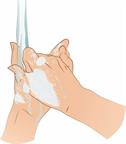Sepsis, Self Care, Adult
Sepsis is a serious illness that may require intensive care in the hospital. The following information explains what you need to know in order to manage your condition after you are discharged from the hospital.
What are the risks?
After being treated for sepsis and discharged from the hospital, you may be at a higher risk for certain problems. These problems may be physical or mental.
Physical problems:
Mental problems:
Follow these instructions at home:
Medicines
-
Take over-the-counter and prescription medicines only as told by your health care provider.
-
If you were prescribed an antibiotic, antiviral, or antifungal medicine, take it as told by your health care provider. Do not stop taking the medicine even if you start to feel better.
Eating and drinking

-
Eat a healthy diet that includes plenty of vegetables, fruits, whole grains, low-fat dairy products, and lean protein. Ask your health care provider if you should avoid certain foods.
-
Drink enough fluid to keep your urine pale yellow.
Alcohol use
-
Do not drink alcohol if:
Your health care provider tells you not to drink.
You are pregnant, may be pregnant, or are planning to become pregnant.
- If you drink alcohol, limit how much you use to:
Activity
-
Rest as told by your health care provider.
-
Avoid sitting for a long time without moving. Get up to take short walks every 1–2 hours. This is important to improve blood flow and breathing. Ask for help if you feel weak or unsteady.
-
Try to set small, achievable goals each week, such as dressing yourself, bathing, or walking up the stairs. It may take a while to rebuild your strength.
-
Try to exercise regularly if you feel healthy enough to do so. Ask your health care provider what exercises are safe for you.
-
Return to your normal activities as told by your health care provider. Ask your health care provider what activities are safe for you.
Preventing infection

-
Keep your vaccinations up to date. Get the flu shot every year.
-
Wash your hands often for at least 20 seconds using soap and water. If soap and water are not available, use hand sanitizer.
-
Practice good hygiene. Keep cuts clean and covered until they heal.
Managing stress
Talk with your health care provider or counselor about ways to reduce stress. He or she may suggest:
Meditation, muscle relaxation, and breathing exercises.
Listening to music.
Talk therapy.
Spending time on hobbies and activities that you enjoy.
General instructions
- Get the right amount and quality of sleep. Most adults need 7–9 hours of sleep each night. To help with sleep:
Keep your bedroom cool and dark.
Do not eat a heavy meal within one hour of bedtime.
Do not drink alcohol or caffeinated drinks before bed.
Avoid screen time, such as television, computers, tablets, or cell phones before bed.
Do not use any products that contain nicotine or tobacco. These products include cigarettes, chewing tobacco, and vaping devices, such as e-cigarettes. If you need help quitting, ask your health care provider.
Talk to trusted family members and friends about your condition. Explain your symptoms to them, and let them know that you are working with a health care provider to treat your condition. This can provide you with one way to get support and guidance.
Keep all follow-up visits. This is important.
Questions to ask your health care provider:
-
What physical and emotional changes do I need to report?
-
Do I need to have someone with me all the time?
-
Is it safe for me to drive?
Contact a health care provider if:
-
You do not feel like you are getting better or regaining strength.
-
You have muscle or joint pain.
-
You frequently feel tired.
-
You are having trouble coping with your recovery.
-
You have nightmares, or trouble falling asleep or staying asleep.
-
You feel sad, down, or depressed more often than not, every day for more than 2 weeks.
-
You have difficulty concentrating.
-
You feel irritable or you cry for no reason.
-
You have difficulty breathing.
-
You have a rapid or skipping heartbeat.
-
You become confused or disoriented.
-
You see, hear, or feel things that do not exist (hallucinations).
-
You have a high fever.
-
You have an infection that is getting worse or not getting better.
-
You have thoughts of hurting yourself or others.
These symptoms may represent a serious problem that is an emergency. Do not wait to see if the symptoms will go away. Get medical help right away. Call your local emergency services (911 in the U.S.). Do not drive yourself to the hospital.
If you ever feel like you may hurt yourself or others, or have thoughts about taking your own life, get help right away. Go to your nearest emergency department or:
-
Call your local emergency services (911 in the U.S.).
-
Call a suicide crisis helpline, such as the National Suicide Prevention Lifeline at 1-800-273-8255 or 988 in the U.S. This is open 24 hours a day.
-
If you’re a Veteran:
Summary
-
Sepsis is a serious illness that may require intensive care in a hospital. You may experience long-term health effects after you are discharged from the hospital.
-
Try to set small, achievable goals each week, such as dressing yourself, bathing, or walking up the stairs. It may take a while to rebuild your strength.
-
Know what symptoms you should get help right away for.
-
Keep all follow-up visits. This is important.
This information is not intended to replace advice given to you by your health care provider. Make sure you discuss any questions you have with your health care provider.

